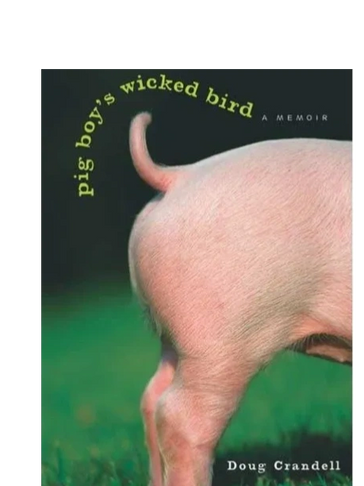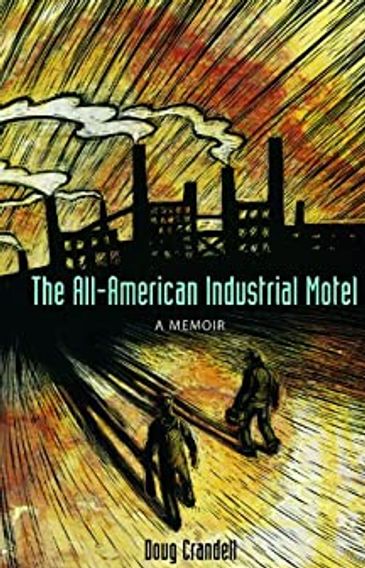Order the new book here: https://equipmentforthedarkness.com
Books

Pig Boy's Wicked Bird: A Memoir
This gritty tragicomic memoir is set in one memorable year—1976, the Bicentennial, when Jimmy Carter ran for president and seven-year-old Doug Crandell lost two fingers in a farming accident. More than anything, Doug wants to shed his nickname, Pig Boy, and grow up to be a hog man like his father. His older brother Derrick reads pulp nov
This gritty tragicomic memoir is set in one memorable year—1976, the Bicentennial, when Jimmy Carter ran for president and seven-year-old Doug Crandell lost two fingers in a farming accident. More than anything, Doug wants to shed his nickname, Pig Boy, and grow up to be a hog man like his father. His older brother Derrick reads pulp novels to him each night as he soaks his remaining fingers in Epsom salts. His brothers urge him to “flip the Wicked Bird” any time another child makes fun of his “lobster-red hand.” Doug shares his summer of healing in Wabash, Indiana, with humans and animals who’ve suffered life-changing traumas: a brutal grandfather gentled by stroke, a deaf dog with a deadly taste for pig’s ears, a tough-love mother coping with depression, a bevy of runt piglets saved from extermination. This is a story of love, loss, healing, and a family’s relation with the land they love and know that they will lose.

The All-American Industrial Motel: A Memoir
This volatile memoir from Doug Crandell weaves a darkly comic and thoroughly heartbreaking coming-of-age tale set in 1990 as the author is about to graduate from college. With very few job prospects and in need of tuition money, he joins his father working at a ceiling tile factory in tiny Lagro, Indiana. As his father moves headlong int
This volatile memoir from Doug Crandell weaves a darkly comic and thoroughly heartbreaking coming-of-age tale set in 1990 as the author is about to graduate from college. With very few job prospects and in need of tuition money, he joins his father working at a ceiling tile factory in tiny Lagro, Indiana. As his father moves headlong into a midlife crisis—complete with a bad toupee and a penchant for drinking on the job—Crandell’s mother struggles with depression and talks in the third person as she manages a fast-food joint, where she compels her crew to dress in homemade costumes. As the author struggles to finish his degree, he also fights the urge to stay where he is and end up a “lifer” like his father. But before long, the monotonous work takes its toll on Crandell, making him realize just how similar he and his dad are. From their joint substance abuse to their feelings about the coworkers they watch buried from asbestosis, the Crandell men struggle to find a way to communicate. This powerful book explores themes of modern manhood, hope, and the power of labor to bring together workers, families, and even macho men.

The Flawless Skin of Ugly People: A Novel
The Flawless Skin of Ugly People: A Novel
Do people have to be beautiful to be loved? Hobbie—this novel’s darkly romantic hero—has been banished to homely man exile in the North Georgia Mountains, where his enemies are mirrors and bears. Things are not going well for Hobbie. His skin is a "pizza face," super-sized, with extra pepperoni and pitted olives. Job status? Former bank
Do people have to be beautiful to be loved? Hobbie—this novel’s darkly romantic hero—has been banished to homely man exile in the North Georgia Mountains, where his enemies are mirrors and bears. Things are not going well for Hobbie. His skin is a "pizza face," super-sized, with extra pepperoni and pitted olives. Job status? Former bank teller. Love life? His common-law wife Kari has gone AWOL at a weight-loss clinic in North Carolina. But just as it seems Hobbie is doomed to go through life as a sweet, self-pitying “anonymous joke,” he jumps out of his skin and becomes downright heroic. Can Hobbie rescue Kari from the weight-loss clinic? Can he pull his fractured family together? Plastic surgery—will he or won’t he? Will love endure if Hobbie’s skin clears up, Kari drops pounds, and ugly people become flawless?
More Books

Fear Came to Town: True Crime
In Santa Claus, Georgia, the streets were named Candy Cane Road and December Drive. Christmas was the lifeblood of the people. One terrible night in December 1997, Heidler broke into the home of his former foster family and brutally murdered them. Doug Crandell describes the harrowing incident that changed this one town forever.

Hairdos of the Mildly Depressed: A Novel
Somewhere between comedy and tragedy lies the second installment to Crandell's Beauty Knows No Pain trilogy (after The Flawless Skin of Ugly People). Brad Orville is stuck in a rut in the middle of Witchfield County, Ga. He lives with his brother, Compton, a former playboy turned mildly brain-damaged dependent after his head was cracked o
Somewhere between comedy and tragedy lies the second installment to Crandell's Beauty Knows No Pain trilogy (after The Flawless Skin of Ugly People). Brad Orville is stuck in a rut in the middle of Witchfield County, Ga. He lives with his brother, Compton, a former playboy turned mildly brain-damaged dependent after his head was cracked open by a man angry at him for sleeping with his wife. Bald Brad, meanwhile, must look after Compton while coming to terms with a betrayal Compton committed years ago. His days are frequently a blur of booze, bad hairpieces and interactions with strange women he meets online. As forest fires and real estate developers encroach on the brothers' family land, Compton and his pregnant wife, Peaches, spend their summer fixing the family farmhouse in preparation for the new addition. The story is painfully believable—from the characterization of two brothers who can't quite connect to the description of what happens to a man's skin when a toupee is left on too long—and has the perverse charms readers of Augusten Burroughs and David Sedaris will recognize.
Copyright © Publishers Weekly.

The Peculiar Boars of Malloy: A Novel
The Peculiar Boars of Malloy: A Novel
This Sherwood Anderson award-winning farcical novel follows two teenage boys living on a farm in rural Indiana. Their father―a diminutive man and the laughingstock of their small town―purchases two boars in an attempt to impress his neighbors and demonstrate, by proxy, his masculinity. The boars, however, turn out to be resolutely gay an
This Sherwood Anderson award-winning farcical novel follows two teenage boys living on a farm in rural Indiana. Their father―a diminutive man and the laughingstock of their small town―purchases two boars in an attempt to impress his neighbors and demonstrate, by proxy, his masculinity. The boars, however, turn out to be resolutely gay and deeply committed to each other, setting off a ridiculous chain of events that brings the spotlight and accompanying media circus to Malloy. In the midst of all of the madness is the boys' ongoing, and at once heartbreaking and hilarious, quest to find their wayward mother through a series of touching and humorous flashbacks. Disappointed in their pitiful father, the boys cling to an unrealistic fantasy of their mother, who is in actuality a promiscuous drifter. Crandell's depiction of the gay boars provides much of the book's humor and, unexpectedly, its moral compass as he weaves significant and subtly articulated themes of animal rights and gay rights. The Peculiar Boars of Malloy captures the best traditions of American satire, while turning the conventions of the coming-of-age novel on its head. Crandell's heart and humor will be appreciated by lovers of satire and animals and those readers possessed of a uniquely Midwestern sense of the ridiculous.
More Books

They're Calling You Home: A Novel
Doug Crandell is a maestro in multiple genres: the author of critically-acclaimed true crime books, devilishly charming memoirs, and tragicomic works of fiction about small-town life that are leavened in equal measure with poignancy and humor.
Enter They're Calling You Home, Crandell's latest novel. This is the story of Gabriel Burke, a w
Doug Crandell is a maestro in multiple genres: the author of critically-acclaimed true crime books, devilishly charming memoirs, and tragicomic works of fiction about small-town life that are leavened in equal measure with poignancy and humor.
Enter They're Calling You Home, Crandell's latest novel. This is the story of Gabriel Burke, a writer who is alienated from everyone he loves for exposing a discomforting family secret in a bestselling memoir. Divorced from his wife, estranged from his daughter, and loathed by his alcoholic brother, Burke must confront all of them when he returns to his hometown in Smallwood, Indiana to chronicle the story of a gruesome mass murder there.
Thus begins this intricately woven tale of redemption and forgiveness, of men paying the wages of masculinity, of sons coming to grips with the sins of their fathers, and of one writer grappling with the burdens of journalistic integrity. Throughout this deftly crafted work, secrets present a hall of mirrors through which Burke must constantly navigate: the secret of his father's sex crimes, the furtive steps his family takes to deny them, and the surreptitious efforts of State and local officials as they try and cover up the murder case he's investigating. Part road trip, part who-dunnit, part voyage of self discovery, Crandell's moving novel is ultimately the story of a journey in which the only possible destination is its starting point—home.

Twenty-Two Cents an Hour: Disability Rights and the Fight to End Subminimum Wages: Nonfiction
In Twenty-Two Cents an Hour, Doug Crandell uncovers the harsh reality of people with disabilities in the United States who are forced to work in unethical conditions for subminimum wages with little or no opportunity to advocate for themselves, while wealthy CEOs grow even wealthier as a direct result.
As recently as 2016, the United Stat
In Twenty-Two Cents an Hour, Doug Crandell uncovers the harsh reality of people with disabilities in the United States who are forced to work in unethical conditions for subminimum wages with little or no opportunity to advocate for themselves, while wealthy CEOs grow even wealthier as a direct result.
As recently as 2016, the United States Congress enacted bipartisan legislation which continued to allow workers with disabilities to legally be paid far lower than the federal minimum wage. Drawing on ongoing federal Department of Justice lawsuits, the horrifying story of Henry's Turkey Farm in Iowa, and more, Crandell shows the history of the policies that have led to these unjust outcomes, examines who benefits from this legislation, and asks important questions about the rise of a disability industrial complex. Exposing this complex―which is rooted in profit, lobbying, and playing on the emotions of workers' parents and families, as well as the public―Crandell challenges readers to reexamine how we treat some of our most vulnerable fellow citizens. Twenty-Two Cents an Hour forces the reader to face the reality of this exploitation, and builds the framework needed for reform.
Well, that's it, at least for now, but how about an old poem just to celebrate how writing begins...
Well, that's it, at least for now, but how about an old poem just to celebrate how writing begins...
Poetry is the most distilled of all forms, and it's always fascinating to find out how many people still write poems. This one is titled: How They Make Methamphetamines.

This website uses cookies.
We use cookies to analyze website traffic and optimize your website experience. By accepting our use of cookies, your data will be aggregated with all other user data.